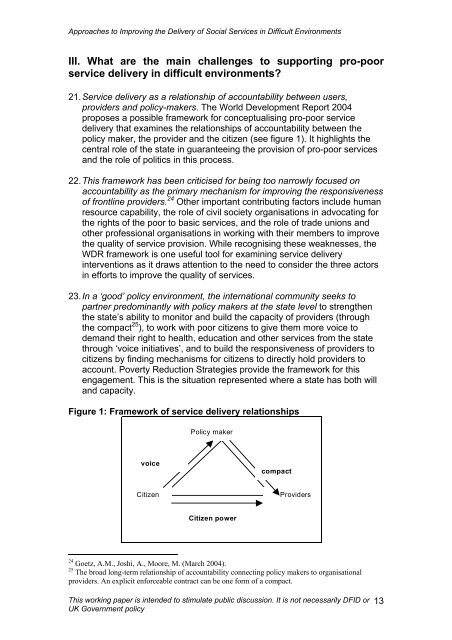<strong>Approaches</strong> <strong>to</strong> <strong>Improv<strong>in</strong>g</strong> <strong>the</strong> <strong>Delivery</strong> <strong>of</strong> <strong>Social</strong> <strong>Services</strong> <strong>in</strong> <strong>Difficult</strong> Environments18. Service delivery <strong>in</strong>terventions may act as a tangible peace dividend <strong>in</strong>countries emerg<strong>in</strong>g from conflict. A number <strong>of</strong> service delivery<strong>in</strong>terventions have been designed and implemented <strong>to</strong> reach down <strong>to</strong> <strong>the</strong>grassroots level help <strong>to</strong> stabilise <strong>the</strong> situation <strong>in</strong> <strong>the</strong> immediate aftermath <strong>of</strong>conflict. Interventions are sometimes referred <strong>to</strong> as ‘quick w<strong>in</strong>s’ or ‘quickimpact’ projects (QIPs). Several agencies employ quick impact typeprojects, <strong>in</strong>clud<strong>in</strong>g DFID, USAID, <strong>the</strong> World Bank, The European Unionand UNHCR 17 . They tend <strong>to</strong> tackle high visibility problems and <strong>to</strong> try <strong>to</strong> w<strong>in</strong>‘hearts and m<strong>in</strong>ds’. In some cases, <strong>the</strong>y are <strong>the</strong> precursor <strong>to</strong> moredevelopmental approaches, centred on community-based reconstruction.19. The literature on <strong>the</strong> role <strong>of</strong> ‘horizontal <strong>in</strong>equalities’ <strong>in</strong> conflict highlights <strong>the</strong>importance <strong>of</strong> considerations <strong>of</strong> equity <strong>in</strong> <strong>the</strong> provision <strong>of</strong> services.Horizontal <strong>in</strong>equalities can be def<strong>in</strong>ed as <strong>in</strong>equality between groups <strong>in</strong>society (<strong>of</strong>ten based on ethnicity or o<strong>the</strong>r group characteristics) ra<strong>the</strong>r thanbetween <strong>in</strong>dividuals (say between <strong>the</strong> rich and <strong>the</strong> poor – so called‘vertical’ <strong>in</strong>equality). This work argues that group exclusion along social,economic, and/or political l<strong>in</strong>es is a source <strong>of</strong> differentiation and is one <strong>of</strong><strong>the</strong> potential triggers <strong>of</strong> conflict 18 . Access <strong>to</strong> services is one <strong>of</strong> <strong>the</strong> fac<strong>to</strong>rscontribut<strong>in</strong>g <strong>to</strong> such differentiation. Exclusion from services, <strong>in</strong> particulareducation, has been highlighted as a fac<strong>to</strong>r <strong>in</strong> conflict <strong>in</strong> countries asdiverse as Burundi, Sri Lanka, Nepal and Kosovo 19 . Efforts <strong>to</strong> reduce<strong>in</strong>equalities <strong>in</strong> access <strong>to</strong> services may help <strong>to</strong> reduce <strong>the</strong> threat <strong>of</strong> conflict.20. Education can be crucial <strong>in</strong> address<strong>in</strong>g <strong>the</strong> underly<strong>in</strong>g causes <strong>of</strong> conflict <strong>in</strong>terms <strong>of</strong> its structures and systems and curriculum content. In countriesemerg<strong>in</strong>g from conflict, education is frequently regarded as hav<strong>in</strong>g acrucial part <strong>to</strong> play <strong>in</strong> rebuild<strong>in</strong>g social cohesion. Systemic approaches arenecessary, which tackle participation and transparency <strong>in</strong> policyformulation, equitable distribution <strong>of</strong> resources, curriculum reform, ando<strong>the</strong>r exclusionary tendencies (such as language <strong>of</strong> <strong>in</strong>struction, separateschool<strong>in</strong>g etc.) 20 . In a conflict situation, education can be a means <strong>of</strong>creat<strong>in</strong>g a peaceful space and <strong>of</strong>fer<strong>in</strong>g children a ‘normal’ experience <strong>in</strong> ano<strong>the</strong>rwise crisis situation 21 . The school curriculum can conversely be usedas a vehicle <strong>to</strong> <strong>in</strong>cite ethnic and racial hatred. There is some evidence, forexample, that <strong>the</strong> Rwandan genocide was partly fuelled by <strong>the</strong> messagesconveyed through <strong>the</strong> education system. The reformulation <strong>of</strong> <strong>the</strong>Rwandan curriculum has been a key element <strong>in</strong> <strong>the</strong> reconstruction effort 22 .In <strong>the</strong> long term, provid<strong>in</strong>g free universal education is perhaps <strong>the</strong> mosteffective policy for reduc<strong>in</strong>g <strong>the</strong> educational <strong>in</strong>equality that contributes <strong>to</strong>unequal employment and livelihood opportunities 23 .17 GRC query (August, 2003) Available at: http://www.grcdfid.org.uk/grc/helpdesk/summary.cfm?qno=13518 Stewart, F. (1999), Klugman, J. (1999), Ostby, G. (2003),19 Jackson, T (June 2000); Perera, L. et al (2004); Lama-Tamang, M. et al (August 2003); DFID HealthSystems Resource Centre (2003)20 Smith, A.. and Vaux, T. (February 2003)21 Nicolai, S. and Triplehorn, C. (2003).22 Obura, A. (2003); Rutayisire, J. et al (2004).23 Klugman, J. (1999).This work<strong>in</strong>g paper is <strong>in</strong>tended <strong>to</strong> stimulate public discussion. It is not necessarily DFID orUK Government policy12
<strong>Approaches</strong> <strong>to</strong> <strong>Improv<strong>in</strong>g</strong> <strong>the</strong> <strong>Delivery</strong> <strong>of</strong> <strong>Social</strong> <strong>Services</strong> <strong>in</strong> <strong>Difficult</strong> EnvironmentsIII. What are <strong>the</strong> ma<strong>in</strong> challenges <strong>to</strong> support<strong>in</strong>g pro-poorservice delivery <strong>in</strong> difficult environments?21. Service delivery as a relationship <strong>of</strong> accountability between users,providers and policy-makers. The World Development Report 2004proposes a possible framework for conceptualis<strong>in</strong>g pro-poor servicedelivery that exam<strong>in</strong>es <strong>the</strong> relationships <strong>of</strong> accountability between <strong>the</strong>policy maker, <strong>the</strong> provider and <strong>the</strong> citizen (see figure 1). It highlights <strong>the</strong>central role <strong>of</strong> <strong>the</strong> state <strong>in</strong> guarantee<strong>in</strong>g <strong>the</strong> provision <strong>of</strong> pro-poor servicesand <strong>the</strong> role <strong>of</strong> politics <strong>in</strong> this process.22. This framework has been criticised for be<strong>in</strong>g <strong>to</strong>o narrowly focused onaccountability as <strong>the</strong> primary mechanism for improv<strong>in</strong>g <strong>the</strong> responsiveness<strong>of</strong> frontl<strong>in</strong>e providers. 24 O<strong>the</strong>r important contribut<strong>in</strong>g fac<strong>to</strong>rs <strong>in</strong>clude humanresource capability, <strong>the</strong> role <strong>of</strong> civil society organisations <strong>in</strong> advocat<strong>in</strong>g for<strong>the</strong> rights <strong>of</strong> <strong>the</strong> poor <strong>to</strong> basic services, and <strong>the</strong> role <strong>of</strong> trade unions ando<strong>the</strong>r pr<strong>of</strong>essional organisations <strong>in</strong> work<strong>in</strong>g with <strong>the</strong>ir members <strong>to</strong> improve<strong>the</strong> quality <strong>of</strong> service provision. While recognis<strong>in</strong>g <strong>the</strong>se weaknesses, <strong>the</strong>WDR framework is one useful <strong>to</strong>ol for exam<strong>in</strong><strong>in</strong>g service delivery<strong>in</strong>terventions as it draws attention <strong>to</strong> <strong>the</strong> need <strong>to</strong> consider <strong>the</strong> three ac<strong>to</strong>rs<strong>in</strong> efforts <strong>to</strong> improve <strong>the</strong> quality <strong>of</strong> services.23. In a ‘good’ policy environment, <strong>the</strong> <strong>in</strong>ternational community seeks <strong>to</strong>partner predom<strong>in</strong>antly with policy makers at <strong>the</strong> state level <strong>to</strong> streng<strong>the</strong>n<strong>the</strong> state’s ability <strong>to</strong> moni<strong>to</strong>r and build <strong>the</strong> capacity <strong>of</strong> providers (through<strong>the</strong> compact 25 ), <strong>to</strong> work with poor citizens <strong>to</strong> give <strong>the</strong>m more voice <strong>to</strong>demand <strong>the</strong>ir right <strong>to</strong> health, education and o<strong>the</strong>r services from <strong>the</strong> statethrough ‘voice <strong>in</strong>itiatives’, and <strong>to</strong> build <strong>the</strong> responsiveness <strong>of</strong> providers <strong>to</strong>citizens by f<strong>in</strong>d<strong>in</strong>g mechanisms for citizens <strong>to</strong> directly hold providers <strong>to</strong>account. Poverty Reduction Strategies provide <strong>the</strong> framework for thisengagement. This is <strong>the</strong> situation represented where a state has both willand capacity.Figure 1: Framework <strong>of</strong> service delivery relationshipsPolicy makervoicecompactCitizenProvidersCitizen power24 Goetz, A.M., Joshi, A., Moore, M. (March 2004).25 The broad long-term relationship <strong>of</strong> accountability connect<strong>in</strong>g policy makers <strong>to</strong> organisationalproviders. An explicit enforceable contract can be one form <strong>of</strong> a compact.This work<strong>in</strong>g paper is <strong>in</strong>tended <strong>to</strong> stimulate public discussion. It is not necessarily DFID orUK Government policy13
















